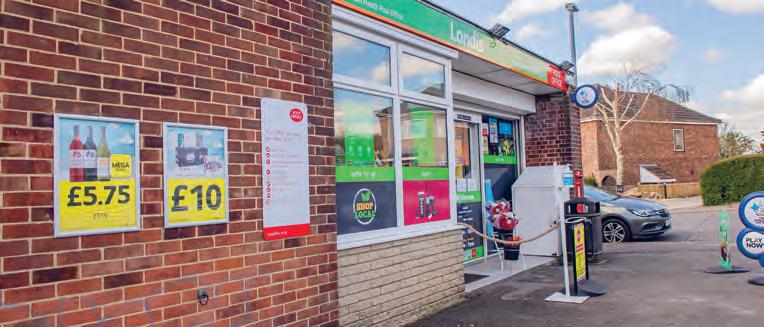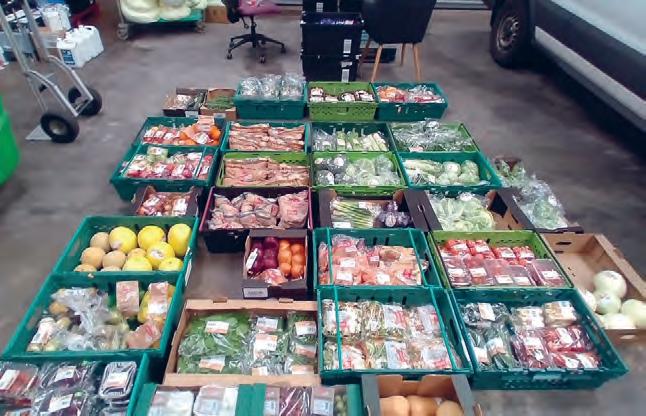
9 minute read
Industry News
DRS countdown begins as SGF threatens legal action
There is now less than a year left for Londis retailers in Scotland to get ready for the implementation of the new Deposit Return Scheme (DRS) which is set to go live next year.
The Scottish Government announced that Scotland’s DRS will go live on 16 August 2023.
Meanwhile, the Scottish Grocers’ Federation (SGF) has threatened legal action against Circularity Scotland, the body appointed by the Scottish Government in 2021 to administer Scotland’s DRS.
SGF has issued a pre-action letter to Circularity Scotland on behalf of the independent retailing sector in Scotland, the largest group of Return Point Operators in the country. SGF believes the proposed retailer handling fee levels will not cover the costs borne by retailers and will significantly impact on their businesses.
SGF CEO Dr Pete Cheema OBE said: ‘’We remain fully committed to working with a range of stakeholders to ensure that Scotland has a world-leading scheme. It is essential however that DRS remains cost neutral to Return Point Operators and does not leave them with an additional cost burden.”
Londis retailers will play a key role in the scheme by collecting empty bottles and cans from shoppers ready for recycling. The scheme will add a refundable deposit of 20p to single use drinks containers to encourage recycling and reduce litter. The scheme includes soft drinks and alcoholic beverages and covers PET plastic bottles, metal cans and glass bottles ranging from 50ml to three litres.
In return, retailers will receive 3.55p per container for the first 8,000 containers returned each week using a reverse vending machine and 1.35p for each additional container.
Retailers opting for manual handling of returns will receive 2.69p per container.
Shoppers return to cash as withdrawals soar
Consumers choosing staycations over foreign holidays and shoppers managing their budgets more tightly have resulted in record cash withdrawals in July.
New figures have revealed Post Offices handled a record £801m in personal cash withdrawals in July with over £3.3bn in cash deposited and withdrawn over Post Office counters, the first time figures have crossed the £3.3bn threshold in Post Office’s 360-year history.
Post Office has attributed the record amount for personal cash withdrawals to more consumers choosing to have staycations in the UK as well as people increasingly turning to cash to manage their budget on a week-by-week basis and often on a day-to-day basis.
Personal cash withdrawals were up almost 8% month-onmonth and up over 20% year-on-year in July.
Martin Kearsley, Banking Director at Post Office, said: “Our latest figures clearly show that Britain is anything but a cashless society. We’re seeing more and more people increasingly reliant on cash.”

Drinkaware adds new retailer resources
Drinkaware, the independent charity which aims to help shoppers make better choices about their drinking, has expanded the suite of resources it has available for responsible independent retailers keen to support their shoppers.

A new online shop increases access to a range of information, training and downloadable assets including free factsheets, posters and digital materials.
The materials will help retailers support shoppers keen to make informed decisions when purchasing and consuming alcohol.

To find out more or to see the range of materials available, please visit: resources. drinkaware.co.uk to access the Drinkaware shop.


Levelling Up investment should ‘prioritise local’
New consumer polling from the ACS has found that 70% of shoppers would prefer to see investment in their local communities rather than in just town and city centres.
As the UK Government continues to pursue its ‘Levelling Up’ policy, a new survey conducted on behalf of the Association of Convenience Stores (ACS) has found that the vast majority of shoppers would prefer to see public investment going into local communities rather than just towns and cities.
Carried out as part of ACS’s 2022 Community Barometer report, the survey found that 70% of consumers would prefer to see investment in their local neighbourhood, compared to just 30% who would prefer investment in their nearest town or city centre. The polling also revealed that support for existing local businesses would be the top investment priority for consumers, followed by better community policing, and support for new businesses locally.
Government policy around levelling up has long been focused on high streets and town and city centres.
ACS Chief Executive James Lowman said: “Our polling clearly shows that people want safe local neighbourhoods with vibrant established businesses and innovative new services. The services in our communities, including local shops, need more support and incentives to invest.”
Independent retailers in Northern Ireland have reiterated their support for the introduction of minimum unit pricing (MUP) for alcohol.
Responding to a consultation, NFRN leaders in the province said MUP would create a “level playing field” and allay fears of cross-border trading.
The move follows the recent publication of a paper by the Department of Finance tax strategy group on tax excise, which suggested the introduction of MUP in the Republic of Ireland earlier this year could lead to less tax being paid due to people shopping across the border.

MUP draws nearer in NI
Booker Trade Shows deliver 12,500 meals for the hungry Caution urged
More than fi ve tonnes of surplus supplier food was collected
from Booker’s two trade shows earlier this year and on NMW
Booker has provided enough food to provide 12,500 meals for those in need after working with the Phoenix Resource Centre charity to collect and distribute over five tonnes of surplus supplier food from Booker’s two recent trade shows at Doncaster and Sandown.

The food would otherwise have gone to waste but was instead used by the charity to help so many people that are struggling to have even the basics following a few hard years for many communities and families.
Andrew Richardson, Trustee and Founder of Phoenix Resource Centre, told Londis News: “Wow, what an amazing couple of shows we had this year with Booker. From both combined we collected 5.25 tonnes of food, equating to a 12,500 meals.

“These donations have enabled us to help thousands of people and lets us give to the most impoverished of our society. It makes such a huge difference. A huge thanks has to go to the Booker team and to all of the suppliers for donating the surplus products.
“We are distributing up to 2,000 meals a day through our partners including Shine in Northampton. They are supporting a very diverse community with a high number of ethnic minorities in the area, a high level of homelessness and disengaged youth. The donated food from the trade shows has a massive positive impact on all of those in need in the area.” The Low Pay Commission (LPC) has been urged to take a “cautious approach” to future National Living Wage rates and to take into consideration the challenges facing employers at the current time.



The Association of Convenience Stores gave oral evidence to the LPC and highlighted the unique and significant challenges faced by independent retailers as a result of the cost of living crisis, increased energy and supply chain costs and other regulatory challenges.
Chief Executive James Lowman said: “It is vital that the Government seeks to set wage rates which avoid negative impacts on businesses and support the good quality employment available in our sector.”

Shared banking hubs to provide cash lifeline for residents
Another 13 locations have been chosen for shared banking hubs to ensure services are available in areas where the last bank branch has closed, reports suggest.
The hubs, run by the Post Office, enable customers of any bank to access their accounts, deposit cash and cheques, and withdraw money at any time. Trickier enquiries are dealt with by representatives from each of the major banks who each visit once a week.
The new hubs will be in Brechin in Angus, Forres in Moray, Carluke in Lanarkshire, Kirkcudbright in Dumfries and Galloway, Axminster in Devon, Barton-upon-Humber in Lincolnshire, Lutterworth in Leicestershire, Royal Wootton Bassett in Wiltshire, Cheadle in Staffordshire, Belper in Derbyshire, Maryport in Cumbria, Hornsea in Yorkshire, and in Kilkeel, County Down.
Retailers ‘pivotal’ in energy bill support scheme
New consumer polling from the ACS has found that 70% of shoppers would prefer to see investment in their local communities rather than in just town and city centres.
PayPoint has joined forces with Citizens Advice to support its current campaign encouraging prepay energy customers to make sure their details are up to date with their supplier in time for the launch of the Energy Bills Support Scheme in October.
Qualifying shoppers will receive vouchers for £400 over a six month period and they will be able to redeem them at all stores with a PayPoint terminal. The payments are designed to ensure households receive financial support throughout the winter months.
The campaign will be promoted in all PayPoint locations via receipt advertising and social media channels. Information will also be sent directly to PayPoint’s retailer partners advising of the campaign and where to direct shoppers for more information.
Steve O’Neill, Corporate Affairs and Marketing Director, PayPoint said: “Our retailer partners continue to play a pivotal role in delivering vital community services across the UK. The upcoming Energy Bills Support Scheme will be another important service for the millions of consumers who use PayPoint regularly to top up and we’re delighted to be working with Citizens Advice to raise awareness of the scheme to ensure that funds reach the members of our communities that need it most.”
Consumer card spending continued to grow in August, up 4.7% year-on-year, although this is the smallest uplift since March 2021. Data from Barclaycard, which sees nearly half of the nation’s credit and debit card transactions, reveals that spending on essential items grew 7.2% year-on-year, its highest growth since December 2021.
Grocery shopping saw its largest year-on-year uplift (4%) since February 2021, partly due to rising inflation while spending on fuel rose 23.9 per cent, its lowest growth in 12 months owing to a slight decline in petrol and diesel prices and drivers opting to reduce vehicle use to save money.




